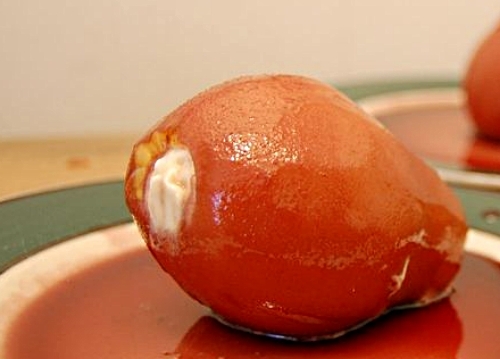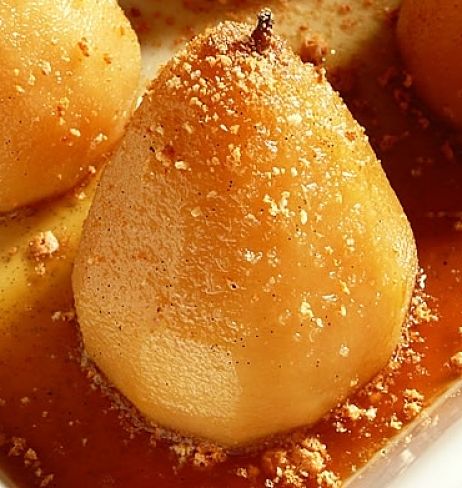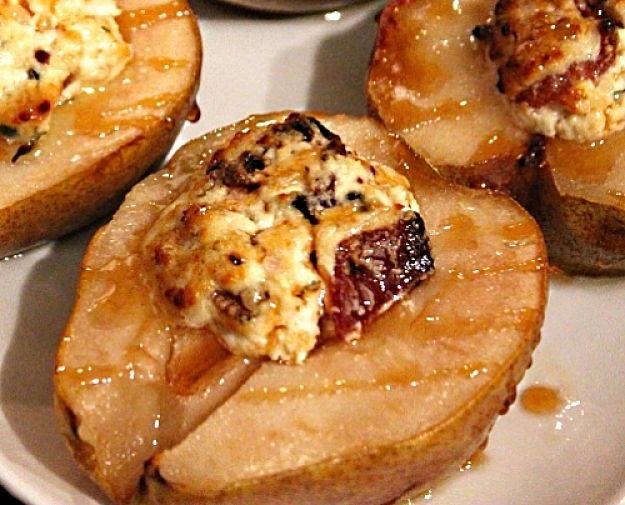Fresh Pear Recipes, Desserts, Savory Dishes, How to Cook, Use Pears
Pears are less acidic than apples and despite being closely related, require different handling and cooking. Fresh pears are generally only available for a short period of time and so you need to do your homework to enjoy pears each season.
There are two broad types of pears:
- Asian pears have crisp texture they are firm and crunchy to bite into and are more like apples, but with less dense flesh. They are ready to eat when you buy them and they can be stored ripe. Some of the popular varieties are: Shinsui, Ichiban Nashi, Shinsieki and Nijisseki.
- European pears are denser and generally become very soft and prone to bruising when they are ripe. Usually the pears are sold unripe and quite hard. They do not keep well when ripe. Popular European pear varieties are Bartlett, Concorde, d'Anjou, Bosc, Comice, and Seckel.
Health benefits of pears
Pears are rich in Vitamins, dietary fiber, anti-oxidants and minerals. There is 3.1 g of fiber per 100g of fresh pears. The calorie level is amongst the lowest of any fruit, with only about 58 calories per 100g (similar to apples and oranges). Pears are rich in Vitamin C, A and B-group complex vitamins such as riboflavin, folates, and pyridoxine. Pears also have moderate amounts of antioxidants such as lutein, beta-carotene and zea-xanthin. Pears are also a good source of minerals such as potassium, manganese, copper, iron, and magnesium.
See the Nutrition Summary below for details.
How to Cook Pears
Poaching Pears
Poaching is the best way to cook pears as it is gentle and retains the gentle and subtle taste of the pears, and the half-pears retain their shape. Always start with firm, ripe pears without skin blemishes. Bosc pears are ideal.
You can adjust the ingredients in the poaching liquid to suit your taste. Some of the options are: fresh ginger, various spices. Citrus such as orange, lime and lemon including the zest, vanilla beans or vanilla essence, various types of white wine. You can also add sugar or honey for a sweeter taste.
Various dressings can be added to the pears once cooked. This includes a variety of dried fruit, such as cranberries, raisins, sour cherries, currents and sultanas (added to the hot liquid helps plump them up.
Poaching pears is very easy. The only things that can go wrong are that you overcook them or they discolor. Any pears that poke out of the water may tend to discolor. This can be prevented by cutting out a circle of parchment paper to fit tightly over the top of the pears. Cut out a small hole to let the steam escape. This prevents the discoloration. Expect the liquid to reduce in volume during the poaching.
Recipe for Poaching Pears
- 1 quart (1 liter) water
- 4 Bosc pears or similar cored, peeled and quartered
- 1 1/3 cup (265 g) sugar (or about half the volume of honey
Any combination of the following:
- 6-8 fresh ginger slices
- 2-3 star anise
- one split vanilla bean
- Half a lemon
- Green or black peppercorns
- 2 teaspoons whole cloves
- One cinnamon stick
Method
Heat the water and sugar in a large saucepan to dissolve the sugar. Add your choice of spices. Gently add the pears and cover with a circle of parchment paper, with a small hole cut in the center. Reduce the heat to create a moderate simmer and cook the pears until they are just tender in the center (generally about 15 - 25 minutes. Remove the saucepan with the pears from the heat and set aside to let the pears cool in the liquid.
When the pears reach room temperature, serve with ice cream or yogurt. Dress with dried fruit and drizzle with a dark chocolate sauce, fresh blackberries or raspberries, or a spoonful of creme fraiche.
Baking Pears
Preheat your oven to 350 degrees F (175 degrees C). Wash the pears, and cut in half, remove the core, but do not remove the peel.
Lay the halved pears, skin side down, on a greased baking dish (butter or cooking spray. Sprinkle the pear halves with ground cinnamon, ground cloves and brown sugar (or honey). Bake in the preheated oven for 20-30 minutes, or until center of the pears has just softened. Don’t overcook. Remove from the oven and serve warm with a drizzle of maple syrup or chocolate sauce.
Grilling Pears
Preheat your barbecue or indoor grill to medium heat. Melt some butter, add some cinnamon and brown sugar, stir and then add to a large bowl. Wash the pears, remove the core, but leave the skin on. Slice them in half. Put the pear halves in the melted butter mixture and toss to coat all surfaces. Take the bowl out to the heated barbecue and using a pair of tongs, place each pear half onto the grill. Cook the pear halves for 3-4 minutes a side, until tender but still firm. Do not overcook. Remove the pears from the grill as they are cooked and place on a warm serving platter. Serve while still warm.
Preparation and Serving Tips
Wash the pears in clean running cold water and remove ay blemishes, but try to retain the skin as it contains most of the nutrients in the pears.
Similar to apples, sliced pear pieces will tend to turn brown on exposure to air. This can be prevented by adding a few drops of fresh lemon juice. Don’t prepare the pears until just before you want to use them.
Eat ripe fresh pears as raw fruits to get all their health benefits.
Pears can be used in a wide variety of ways as fruit juices, jams, pies, and in fruit salad. Pears can also be used for many savory dishes.
Asian Pear and anise make a good combination for salads.
Pear and cinnamon is a good combination for cooked pears, clafoutis, hot pear puddings, tarte tatin or upside-down cakes and many desserts.
Pear and Hard Cheeses is a good combination both in terms of taste and texture.
Pears and pork – Both apples and pears go well with pork, but probably goes best with the leaner cuts of pork that are roasted or grilled.
Pear and Prosciutto are a nice combination.
Pear and Walnut is a good combination for a salad.
Nutrient Summary for Pears
| Nutrients for 100g Fresh Pears | Value |
| Energy | 58 Cal |
| Carbs | 13.8 g |
| Protein | 0.4 g |
| Total Fat | 0.1 g |
| Cholesterol | 0 mg |
| Dietary Fiber | 3.1 g |
| Vitamins | |
| Folates | 7 micro g |
| Niacin | 0.16 mg |
| Pantothenic acid | 0.05 mg |
| Pyridoxine | 0.03 mg |
| Riboflavin | 0.03 mg |
| Thiamin | 0.01 mg |
| Vitamin A | 23 IU |
| Vitamin C | 4.2 mg |
| Vitamin E | 0.1mg |
| Vitamin K | 4.5 micro g |
| Electrolytes | |
| Sodium | 1 mg |
| Potassium | 119 mg |
| Minerals | |
| Calcium | 9 mg |
| Copper | 0.08 mg |
| Iron | 0.2 mg |
| Magnesium | 7 mg |
| Phosphorus | 11 mg |
| Zinc | 0.1 mg |
| Phyto-nutrients | |
| Carotene-beta | 12 micro g |
| Crypto-xanthin-beta | 2 micro g |
| Lutein-zeaxanthin | 45micro g |

Delicious Poached Pears really allows the gentle flavor to shine through
;stu_spivack [CC-BY-SA-2.0], via Wkimedia Commons

Original Photo by the Author: Beautiful baked pears are a delight. See how easy it is to bake pears in the oven

Original Photo by the Author: Grilled Pears accentuate the slight acidity and sweetness of pears